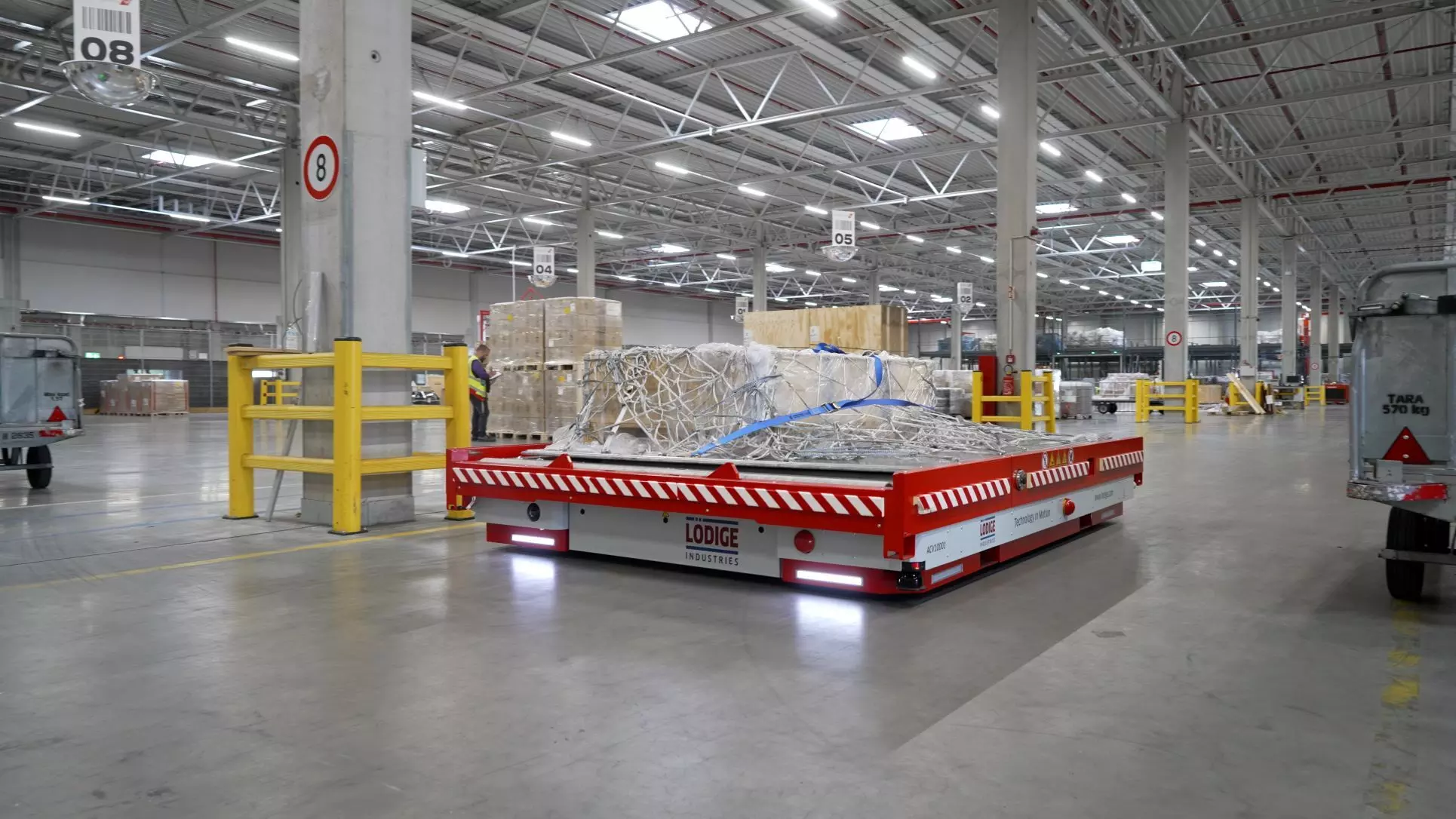Global air cargo demand surged 13.6% in July 2024. As the industry faces unexpected growth, cutting-edge technologies are revolutionising operations, from AI-driven analytics to fully automated warehouses.
The air cargo industry is experiencing a technological renaissance, driven by the need for greater efficiency, sustainability, and adaptability in an ever-changing global market. Cutting-edge technologies are transforming the sector and it’s clear that innovation is no longer just a buzzword – it’s a necessity for survival and growth in this competitive landscape.
The unexpected surge: Air cargo industry’s remarkable growth
According to a Xeneta report, global air cargo demand increased by 12% year-on-year in the first seven months of 2024. This growth was unexpected, as forecasts from October 2023 had predicted an increase of only 1-2% due to factors such as inventory destocking, high inflation, and elevated interest rates, which were expected to weaken consumer demand and global trade and if the robust demand observed in the first seven months of 2024 persists, the year is likely to witness double-digit growth in air cargo demand for the full year.
The total air cargo demand, measured in cargo tonne-kilometers (CTKs), rose by 13.6 percent in July 2024 compared to July 2023 levels (14.3% for international operations). This is the eighth consecutive month of double-digit year-on-year growth, according to the latest data from the International Air Transport Association (IATA). This growth underscores the increasing need for advanced solutions to handle rising volumes efficiently. From artificial intelligence to advanced digital cargo management systems (CMS), these innovations are reshaping how cargo moves through the skies.
“Emerging tech trends are reshaping the air cargo sector. First, artificial intelligence (AI) is revolutionising operations, enhancing efficiency in cargo handling, first-mile and last-mile delivery, route, and traffic management, and capacity optimisation.
Successful AI applications include predictive maintenance, automated warehouses, dynamic pricing models, and demand forecasting, all driving significant improvements in the industry.
“At Kale Logistics Solutions, we are continuously innovating our portfolio to address critical areas in air freight.” Amar More, Kale Logistics Solutions
Second, sustainability is now central to the air freight supply chain. Initiatives such as paperless operations, CO2 emission reductions, and minimising truck congestion at airports are gaining traction, reflecting the industry’s commitment to environmental responsibility.
The growing demand for Cargo Community Systems (CCS) is also transforming air cargo logistics. These systems are becoming essential for airports and handling companies, enabling real-time information exchange, improving efficiency, and synchronising land and airside operations. By adopting CCS, airports are evolving into fully integrated cargo hubs, paving the way for more streamlined and coordinated logistics,” says Amar More Chief Executive Officer, Kale Logistics Solutions.
AI revolution in air cargo
AI-driven systems in air freight warehouses are increasingly used to automate inventory management and handling processes. Robotics powered by AI algorithms can pick, sort, and store goods, significantly reducing human error and boosting efficiency.
“Speedcargo’s AI-powered solutions help airlines maximise their cargo capacity utilisation—from the cargo booking stage through to the time it enters the bellies of aircraft. This helps them increase their revenues, of course, but also reduces up to 1 flight every 7-8 flights. With our automated cargo handling solution, we estimate an approximate 40% increase in efficiency,” says Dr. Suraj Nair, Founder and Chief Technology Officer at Speedcargo Technologies.

“The air cargo industry is highly interconnected by nature, but the technology connecting the stakeholders often tends to be siloed and fractured.” Dr. Suraj Nair, Speedcargo Technologies
“State-of-the-art robotics can have increased throughput in limited space and creates a highly connected workflow which is efficient, sustainable, and cost-efficient. The benefits, Return On Investment (ROI), and savings from automation can clearly be seen from the other industries that have adopted it early on.”
The digital side of AI, such as machine learning and data analytics, is also crucial in the air cargo and logistics industry. It enables companies to optimise operations, improve efficiency, and reduce costs. For example, Raft, a company specialising in AI-powered workflow automation for freight forwarders and customs brokers, recently announced that Navia, an integrated global freight and logistics company, has successfully implemented its AI-driven logistics finance capability to efficiently process high volumes of invoices.
Digital transformation on the rise
Today the air cargo industry grapples with increasing volumes and complexities, digitalisation and integration have emerged as key drivers of efficiency and transparency. Digital Cargo Management Systems (CMS) are at the forefront of this transformation, offering comprehensive solutions that streamline operations across the entire cargo handling process.
Yuval Baruch, CEO of Hermes Logistics Technologies (HLT), emphasises the importance of these digital solutions:
“HLT provides our customers with digital cargo management systems (CMS). Our software is designed to streamline air cargo operations, delivering efficiencies that save our customers time and money.
Our newest Hermes 5 SaaS is delivered entirely through automated coding and scripts, which means faster deployment and less downtime for our customers.”
“At Kale Logistics Solutions, we are continuously innovating our portfolio to address critical areas in air freight such as e-commerce, cybersecurity, pharmaceutical tracking, sustainability goals, and logistics e-marketplaces. Our Logistics Control and Customs Tower (LCCT) is a cutting-edge solution that streamlines cross-border cargo movement for exporters and importers through a single platform, enabling seamless clearances, documentation, and export-import (EXIM processes). This integrated platform becomes even more transformative when connected with our Airport Cargo Community System (ACS), creating a fully automated supply chain for all stakeholders,” says More of Kale Logistics Solutions.
Overcoming Inertia: Slow technology adoption in air cargo
While digital solutions are revolutionising air cargo operations, many industry experts point out that the sector has been slow to embrace technological change. This lag in adoption presents both challenges and opportunities for innovation.
“The air cargo industry has been late in adopting technological advances — not a lot has been done in the last 30-40 years. While digitalisation has now been accelerated, the change in the mindsets of adopters has not evolved as quickly. This change is essential for these advanced technologies to be truly integrated in everyday operations.
We at Speedcargo would like to continue to pioneer robotics in the industry and be at the forefront of the transformation in the industry. For us, automation is not just a trend, it is the inevitable future where the efforts put into digitalisation right now will be truly realised,” says Dr. Nair of Speedcargo Technologies.
Automating warehouses and a glimpse of the future
The recent 2024 Q3 Global Freight Transportation and Logistics Trends report by UPS indicates that the air freight market has continued to experience strong growth in the first half of 2024, fueled by the booming demand for e-commerce. An early peak season is anticipated as the ocean freight market remains highly volatile. As cargo volumes are growing issues like labour shortages persist, therefore automation in warehouses are becoming essential rather than optional.

“HLT is working with dnata, Lödige Industries, Nallian, and a few other partners to create a state-of-the-art, fully automated cargo warehouse at Amsterdam Airport Schiphol.” Yuval Baruch, Hermes Logistics Technologies
According to IATA, the next generation of technology-enhanced cargo facilities will feature fully automated high-rack warehouses, autonomous green vehicles navigating through the facility, and employees equipped with advanced tools, including Artificial Intelligence (AI) and Augmented Reality (AR). These innovations are set to boost productivity, enhance operational efficiencies, and improve responsiveness to customers.
“We are looking at automation in the warehouse. There have already been a lot of use cases in the e-commerce world, the first one for fulfilment centres, distribution centres and so on. We are also digitising processes. You scan the goods when you offload them from a truck at the airport. You can scan them, see the size, see the weight, see the labels, match them according to your bookings, and input all this data into your system,” says Andre Majeres, Head of eCommerce and Cargo Operations, IATA.

An automated guided vehicle of Swissport, Image: Swissport
“HLT is working with dnata, Lödige Industries, Nallian, and a few other partners to create a state-of-the-art, fully automated cargo warehouse at Amsterdam Airport Schiphol. Our cloud-based cargo management system sits at the heart of a large, integrated system, helping to leverage Lödige’s warehouse automation technology and Nallian’s landside management to create a seamless and efficient operation,” says Baruch of Hermes Logistics Technologies.
Addressing key issues: Cybersecurity and supply chain disruptions
With great connectivity comes great responsibility. Cybersecurity and supply chain disruptions in air cargo and logistics have become critical concerns in recent years.
“Adhering to rigorous information security processes is crucial for any organisation working with data. We went through a comprehensive evaluation of our processes, ensuring that they align with internationally recognised standards to obtain our ISO27001 certification,” states Dr. Nair of Speedcargo Technologies.
While standardisation is key, innovative technologies are also playing a crucial role in addressing cybersecurity and supply chain challenges. As Baruch of Hermes Logistics Technologies explains:
“Our cloud-based solutions enable real-time tracking and predictive analytics, allowing customers to identify potential disruptions early and swiftly adapt to changing conditions. They also help reduce the risk of cybersecurity breaches. Weak encryption, decentralised security, and outdated systems make operations vulnerable, and our cloud-based solutions offer security features specifically designed to counter these threats.”
As the air cargo industry soars to new heights, technology is the wind beneath its wings. From AI-driven operations to fully automated warehouses, innovation is reshaping every facet of logistics. While challenges remain in adoption and security, the future looks more promising.




















